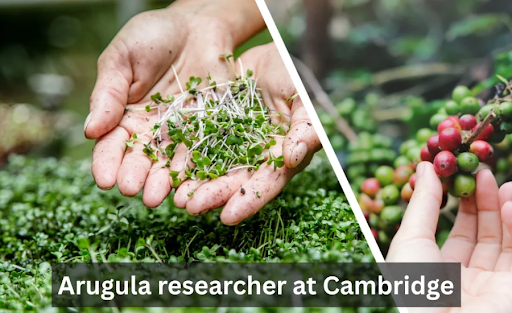Unveiling the World of the Arugula Researcher at Cambridge: Science, Nutrition, and Innovation
If you’re searching for answers related to the arugula researcher at Cambridge, you might have stumbled upon a 15-letter crossword clue from the LA Times Crossword, dated September 18, 2024. But beyond the puzzle, there’s a deeper curiosity: Is there really an arugula researcher at Cambridge? The short answer is yes — and their work is more important than you might think. In this article, we’ll explore not just the buzz around the crossword clue, but also the real-world implications of arugula research at elite institutions like Cambridge University. From nutritional breakthroughs to environmental sustainability, this seemingly simple leafy green plays a complex role in the global food and health landscape.
Understanding Arugula: More Than Just a Salad Green
Arugula, also known as rocket or Eruca vesicaria, is a peppery, leafy green that belongs to the Brassicaceae family — the same group that includes broccoli, cabbage, and mustard. Often associated with Mediterranean cuisine, arugula is packed with nutrients like vitamin K, folate, and antioxidants such as glucosinolates.
In recent years, arugula has become a focus of advanced research due to its potential in disease prevention, soil health, and urban farming. So, when we hear about an arugula researcher at Cambridge, we’re not just talking about someone who grows salad greens in a lab. These researchers are diving deep into genetics, bioactive compounds, and climate resilience.
The Rise of Functional Foods and Arugula’s Role
Functional foods — those that offer health benefits beyond basic nutrition — are becoming a top priority in nutrition science. Arugula is under the microscope for its cancer-fighting and anti-inflammatory properties. The arugula researcher at Cambridge is studying how these bioactive compounds interact with human cells, and whether arugula can be enhanced through biofortification.
Cambridge University has long been at the forefront of food science innovation. Their work in agrigenomics, plant physiology, and sustainable food production includes leafy greens like arugula, aiming to make them more nutritious and resilient.
Genetic Research and Plant Breeding Innovations
One key focus for the arugula researcher at Cambridge involves identifying the genetic markers that make arugula such a nutritional powerhouse. By mapping its genome, researchers can pinpoint genes responsible for flavor, shelf life, pest resistance, and nutrient density.
In plant breeding, this information is invaluable. Scientists can selectively breed arugula strains that grow faster, taste better, and thrive in less-than-ideal soil conditions. With climate change threatening traditional agriculture, these breakthroughs are essential for future food security.
Climate Change and Sustainable Farming: Why Arugula Matters
With rising temperatures, soil degradation, and water scarcity, traditional crops are under stress. That’s where crops like arugula come in. It’s relatively drought-tolerant, grows quickly, and adapts well to vertical farming systems — a perfect candidate for sustainable agriculture.
The arugula researcher at Cambridge is currently exploring how arugula can be integrated into controlled-environment agriculture, like hydroponics and aeroponics. These closed-loop systems could help feed populations in urban areas or in regions with limited arable land.
Arugula in Urban Agriculture and Space Farming
Believe it or not, NASA and other space agencies are looking at arugula as a possible crop for space missions. Why? It grows fast, doesn’t take up much space, and is nutrient-rich. Researchers at institutions like Cambridge are working alongside aerospace scientists to test arugula’s viability in microgravity.
Back on Earth, urban farms and vertical greenhouses are adopting arugula as a core crop. The arugula researcher at Cambridge is analyzing different growth systems to optimize yield, flavor, and nutrient content in limited-space farming environments.
Cross-disciplinary Collaborations and the Arugula Researcher’s Role
Cambridge University fosters a collaborative research environment. The arugula researcher at Cambridge often works with departments of nutrition, public health, environmental science, and engineering. Together, they explore how this leafy green fits into broader societal goals, such as reducing food deserts and promoting health equity.
These interdisciplinary projects help translate lab discoveries into real-world applications — such as school lunch programs, wellness campaigns, and urban food gardens.
Arugula and Human Health: What the Science Shows
Ongoing clinical trials supported by Cambridge researchers are examining how regular consumption of arugula may reduce markers of inflammation, improve gut health, and even support cardiovascular health. Rich in nitrates, arugula may help regulate blood pressure and improve athletic performance.
The arugula researcher at Cambridge plays a crucial role in these studies, linking plant biochemistry with human metabolism to understand how arugula’s compounds are absorbed and utilized by the body.
Economic Impact and Agricultural Policy
Agriculture isn’t just about food — it’s an economic driver. By improving arugula’s resistance to pests and its post-harvest life, researchers can help reduce food waste and improve farmers’ profitability. The arugula researcher at Cambridge contributes to policy discussions, helping shape agricultural subsidies, sustainability incentives, and export standards for leafy greens.
This research is influencing guidelines for how arugula is grown, processed, and distributed globally, especially in developing countries seeking affordable nutrition options.
Innovations in Food Technology and Processing
The arugula researcher at Cambridge is also collaborating with food technologists to develop new ways to incorporate arugula into everyday products — think powdered greens, nutrient-rich snack bars, or arugula-infused oils. By making it shelf-stable and versatile, researchers are opening the door to new markets and consumption habits.
These innovations not only support better nutrition but also reduce dependence on less healthy processed foods.
The Cultural Significance and Evolving Public Perception
Though once overlooked, arugula is gaining recognition as a “smart food” — both culturally trendy and scientifically validated. With the rise of plant-based diets, arugula is no longer just a garnish; it’s a staple. Thanks to the arugula researcher at Cambridge, public awareness is increasing around its benefits, sustainability, and culinary versatility.
Social media, cookbooks, and celebrity chefs are helping change its image, and research-backed articles are reinforcing why arugula deserves a regular spot on your plate.
Conclusion
So, whether you’re solving a crossword or searching for ways to boost your health, the term arugula researcher at Cambridge is more than a clever clue — it represents a deeper world of science, sustainability, and innovation. From gene editing to urban farming, and from clinical nutrition to space exploration, the work being done at Cambridge is helping redefine how we think about food, agriculture, and wellness.
The next time you toss arugula into your salad, remember — that humble green is part of a much bigger story, and the researchers behind it are helping build a healthier, more sustainable future.
FAQs About the Arugula Researcher at Cambridge
Q1. Who is the arugula researcher at Cambridge?
A. The arugula researcher at Cambridge is a plant scientist focused on studying the nutritional and agricultural benefits of arugula, particularly its genetic makeup, health properties, and sustainable farming potential.
Q2. Why is arugula being researched at Cambridge University?
A. Arugula is being researched for its nutrient-rich profile, potential disease-fighting compounds, and adaptability to climate-smart farming practices, making it a key crop for future food systems.
Q3. What health benefits of arugula are being studied?
A. Researchers are exploring arugula’s effects on heart health, inflammation, blood pressure regulation, and its natural antioxidants like glucosinolates and nitrates.
Q4. Is the arugula researcher at Cambridge involved in sustainability?
A. Yes, the research includes sustainable farming methods such as hydroponics and vertical agriculture to grow arugula in eco-friendly ways.
Q5. What is functional food and how does arugula fit in?
A. Functional foods offer health benefits beyond basic nutrition. Arugula is being studied as a functional food due to its rich nutrients and bioactive compounds.
Q6. How does genetic research help arugula farming?
A. By mapping the arugula genome, scientists can breed stronger, more nutritious, and climate-resilient arugula varieties for farmers worldwide.
Q7. Could arugula be used in space farming?
A. Yes, arugula’s fast growth and nutrient density make it a promising crop for controlled environments like space stations and lunar greenhouses.
Q8. What kind of collaborations does the Cambridge team work on?
A. The arugula researcher at Cambridge often collaborates with health scientists, agritech engineers, and urban farming experts on interdisciplinary projects.
Q9. Has this research influenced public health or policy?
A. Findings from arugula research are used to guide nutrition recommendations, school meal programs, and sustainable agriculture policy discussions.
Q10. Where can I learn more about arugula research at Cambridge?
A. You can explore Cambridge’s Department of Plant Sciences website or check out academic journals featuring recent studies on arugula’s health and farming potential.






